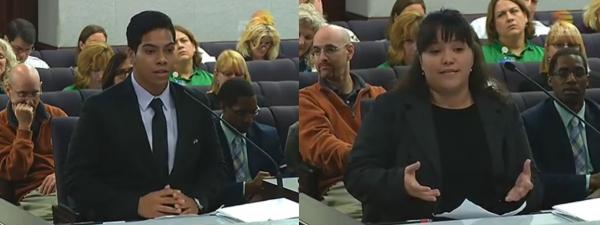A new law aimed at helping those who would otherwise have aged out of Florida’s foster care system when they turn 18 is going well so far, but may still need some more work. That’s according to the state’s child welfare agency as well as some foster youth who are taking advantage of the programs under the new law.
It’s been barely a year since the “Nancy C. Detert Common Sense and Compassion Independent Living Act” got signed into law. And, it’s only been a few months since the law authored by Detert took effect.
By extending the time children can remain in foster care, Detert says the idea is to make sure older foster kids have the tools needed before they go out on their own.
“That age from 18 to 21 is to be able to produce citizens that can then leave the system, be out of care, and be independent, and be good workers and be good little taxpayers, instead of being homeless, be out of work, or in jail,” said Detert.
The Florida Department of Children and Families works with the Community Based-Care organizations known as CBCs to provide services for foster care youth and parents. Normally, included in those services are periodic classes foster youth attend, which teach so-called “life skills” in a classroom setting.
“Well, when we talk about life skills, we’re talking about financial management, about the checkbook, can they cook for themselves, or if they would they rather go shop and purchase, do they have an idea of nutrition and health management, and those sorts of things,” added Detert.
That’s Kristi Gilmore, the Chief of Policy and Practice for DCF’s Office of Child Welfare. She’s speaking during one of several videos tailored toward foster parents and foster youth to help them understand the new law.
Now, the responsibility of teaching those life skills to foster youth are transferred to foster parents and group home primary caregivers, who also receive an increase in pay.
Also, under the new statute, foster youth aging out of the system get to choose from several options. Among them is what’s called Extended Foster Care for those who must be in high school or have a GED or be working for 80 hours a month.
“The reason I enrolled into Extended Foster Care was because I knew I was going to age out of the foster care system and I was scared because I didn’t know what was going to happen to me,” said Christian Aguilar, who’s currently enrolled in that program.
Aguilar says while he wishes there were more avenues to provide legal representation for those in the program, he sees the benefits.
“What I like about being in Extended Foster Care is definitely the fact that I know that I have a support system behind me to guide me. It helps a lot when you need help from, like a parent figure, when you need to make decisions, like about school or on an everyday life basis,” added Aguilar.
The new law also creates what’s called Postsecondary Education Services and Support, or PESS—which Georgina Rodriguez is currently enrolled.
“A young adult is allowed to take 9 credits in college and considered eligible for postsecondary funding and that really allows young adults to go and get full-time employment and be able to be self-sufficient prior to turning age 23,” said Rodriguez, who also represents Florida Youth SHINE, an advocacy group for foster youth.
Under that program, foster youth are also eligible for a monthly stipend. That money is not taken away, even if they qualify for financial aid or a scholarship—which Rodriguez says she likes. But, she says the implementation of the actual program needs a bit more work.
“Implement some sort of state guideline for coordinators can follow so that everyone across the state are on the same page and follow one rule. So, An example of this would be different areas throughout the state interpret how whether or not a young adult must enroll and attend college over the Summer to receive Postsecondary Education Services and Support,” she added.
And, speaking before a recent Senate Children, Families, and Elder Affairs Committee hearing, Stephen Pennypacker praised the new law. But, the DCF’s Assistant Programs Secretary says he too believes there are some areas that need improvement—starting with their recruitment efforts.
“We need additional foster homes and housing options for the young adults. Because of the increased population, the increased need for them to have a place to stay, and for foster parents to be able to house young adults, we need more recruitment and we need that to be met,” said Pennypacker, last week.
The new law took effect January 1st. According to DCF, over a two-month period—January to February—164 foster youth elected to go into the Extended Foster Care program until the age of 21, and 602 are enrolled in the Postsecondary Education Services and Support program until the age of 23.
Also, within that same time frame, close to 60-percent elected to stay in the foster care system. Those who opted not to still get the chance to enter back into the foster care system, under the new law.
Read the original article here.


